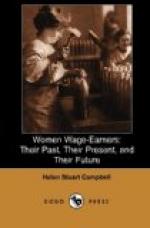Turning from this informal examination of the subject to the few labor reports which have taken up the matter, it becomes plain that domestic service is in many points more undesirable than any other occupation open to women. The Labor Commissioner of Minnesota reports, while stating all the advantages of the domestic servant over the general worker, that “only a fifth of those who employ them are fit to deal with any worker, injustice and oppression characterizing their methods.” Figures and detailed statements bear him out in this conclusion. The Colorado Commissioner gives even more details, and comes to the same conclusion; and though other reports do not take up the subject in detail, their indications are the same.
The first general and rational presentation of the subject in all its bearings, both for employed and employer, has lately been made during the Woman’s Congress at Chicago, May, 1893, in which the Domestic Science section discussed every phase of wrongs and remedies.[48] The latter sum up in the formation of bureaus of employment in every large city, fixed rates, and full preparatory training. A keen observer of social facts has stated: The intelligence offices of New York alone receive from servants yearly over three million dollars, and are notoriously inefficient. This, or even half of it, would provide a great centre with training-schools, lodgings for all who needed them, and a system by which fixed rates were made according to the grade of efficiency of the worker. Till household service comes under the laws determining value, as well as hours and all other points involved in the wage for a working-day, it will remain in the disorganized and hopeless state which at present baffles the housekeeper, and deters self-respecting women and girls from undertaking it. To bring about some such organization as that suggested will most quickly accomplish this; and there seems already hope that the time is not distant when every city will have its agency corresponding to the great Bourse du Travail in Paris, but even more comprehensive in scope. Co-operation within certain limited degrees, so that private home life will not be infringed upon, must necessarily make part of such a scheme, and has already been tried with success at various points in the West; but details can hardly be given here. It is sufficient to add that with such new basis for this form of occupation the “servant question” will cease to be a terror, and the most natural occupation for women will have countless recruits from ranks now closed against it.
FOOTNOTES:
[41] Fifteenth Annual Report of the Massachusetts Bureau of Labor, p. 68.
[42] Ibid.
[43] House of Representatives Report No. 2309: Report of the Committee on Manufactures on the Sweating-System, House of Representatives, January, 1893.
[44] Child Labor. By William F. Willoughby, A.B. Child Labor. By Miss Clare de Grafenried, Publications of the American Economic Association, vol. v. no. 2.




